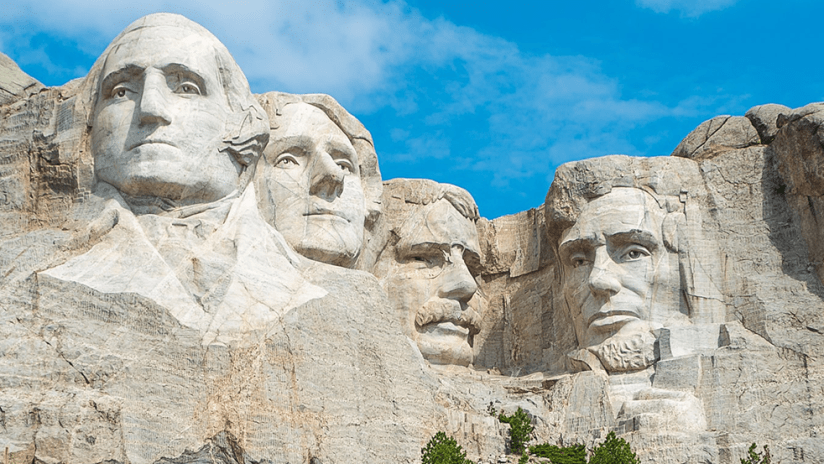How are you doing? Healthy and somewhat sane, I hope. These are strange, anxious times. I don’t mean to scare you, but COVID-19 can affect you and yours. It happened to me. Do what you must to protect yourself and your community.
That’s important and urgent, but it’s also exhausting. We need diversions, something to keep our anxious minds quiet. I’m desperate to think about or talk about soccer. I miss it. And because we all miss it, Extratime driven by Continental is filling the live-match void by naming our Mount Rushmore for every single MLS team over the coming weeks.
This week, we added the final four teams — Sporting Kansas City, Minnesota United, New England Revolution and the Colorado Rapids — to the mix. You can listen to the latest discussions on Thursday's Extratime via the player below or, better yet, subscribe to the podcast on your favorite platform via these links (iTunes, Stitcher, Google Play Music) so you don’t miss a show. And be sure to scroll down to see who made the cut for all 24 teams in MLS as of last season.
Some decisions were easy. Others were agonizing. Feel free to disagree and @ us or drop your choices in the comment sections. Before you get all riled up, please keep in mind that we did not include coaches or executives in the discussion. They’re honored in other ways. Mount Rushmore* is for players ONLY.
Alright, let’s get to it.
*I’d be remiss if I didn’t mention that the history of Mount Rushmore is, like much of human history, problematic. You can read about why here (and in many other reputable sources).
Jump to a specific club
Atlanta United
Chicago Fire FC
FC Cincinnati
Colorado Rapids
Columbus Crew SC
FC Dallas
D.C. United
Houston Dynamo
LAFC
LA Galaxy
Minnesota United FC
Montreal Impact
New England Revolution
New York City FC
New York Red Bulls
Orlando City SC
Philadelphia Union
Portland Timbers
Real Salt Lake
San Jose Earthquakes
Seattle Sounders
Sporting Kansas City
Toronto FC
Vancouver Whitecaps
Sporting Kansas City
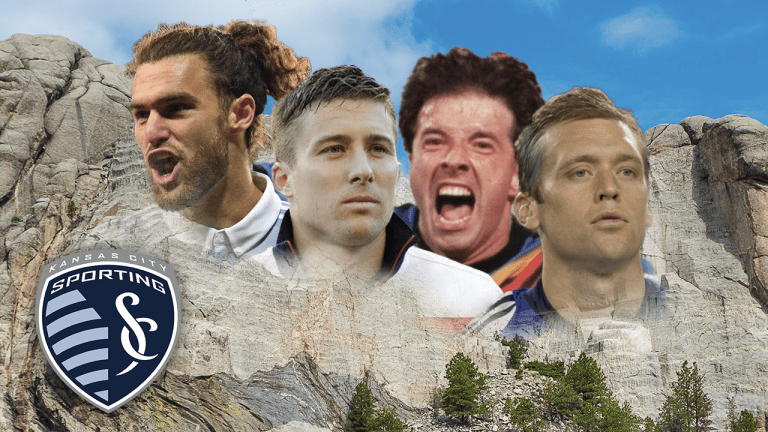
Preki
MLS named the MVP award after Landon Donovan, but only one man has won it twice in his career. Preki was 32 years old when Major League Soccer kicked off in 1996, but age doesn’t matter when you can do what the Belgrade-born U.S. international could do with the ball at his feet. He won his second MVP at the age of 40 and spent all but one MLS season in Kansas City – a 2001 stint with the Miami Fusion, complete with Supporters’ Shield – and brought the then-Wizards their first MLS Cup and Shield in 2000.
Jimmy Conrad
Conrad’s run from 2004-2008, a stretch that included four Best XIs and a Defender of the Year award in five years, is arguably the best run by a defender in the history of this league. He brought personality and toughness to Kansas City, and made the city and club proud in the 2006 World Cup. He’s one of 10 players to play more than 200 games in the history of the club. He’s a club legend, even if he didn’t retire in Kansas City.
Matt Besler
How’s this for a career: Hometown kid gets drafted in the first round by the club he grew up supporting and ends up the all-time leader in games. He’s a one-club man, team captain, MLS Cup champion, three-time US Open Cup champion, Defender of the Year (2012), two-time Best XI selection and four-time All-Star. Besler took the torch from Conrad, made himself into one of the best central defenders in the league and helped establish Sporting as one of the strongest clubs in MLS.
Graham Zusi
This was tough. In the Wizards era, you’ve got Peter Vermes (the don’t-even-need-to-think-about-it top coach in the history of the club), Kerry Zavagnin, Tony Meola, Chris Klein and Davy Arnaud. In the Sporting KC era, it’s Roger Espinoza, Benny Feilhaber, Seth Sinovic (hometown guy) and Jimmy Nielsen. Zusi is our choice for his combination of longevity (just behind Besler on the all-time games list, never played for any other club), individual excellence (7x All-Star, 2x Best XI) and trophy haul (MLS Cup, 3x USOC). He’s a Sporting icon.
Minnesota United
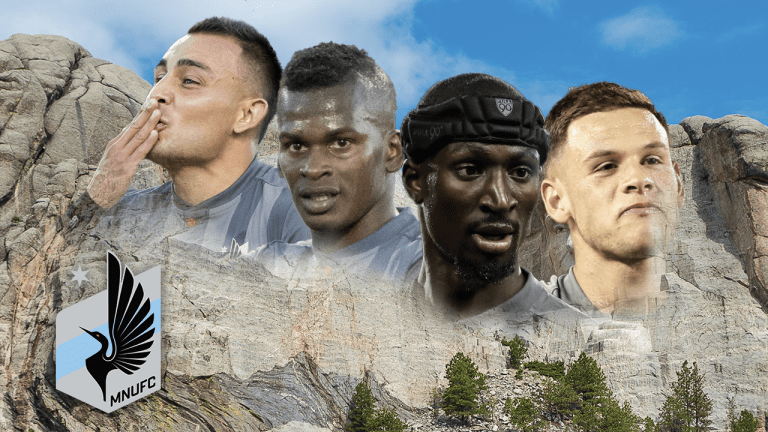
Christian Ramirez
We’re only counting MLS days, but Superman’s relationship with the supporters and the city goes way back. He’s still their all-time leading MLS goalscorer (tied with Darwin Quintero with 21), and he’ll always have a place in Loons fans’ hearts, even when he returns as a member of the Dynamo.
Miguel Ibarra
Doesn’t matter that he’s in Seattle now. Batman has to be here, too. Nobody’s played more games for the club in MLS. Add what Ibarra meant to Minnesota United before the jump up a level, and you can’t escape the fact that he belongs in the Pantheon.
Darwin Quintero
Look, we’re talking about three years of history here, which means Quintero’s place is a little shaky long term. He brought class and explosiveness to a club that desperately needed it. He gave the Loons some swagger, some belief. No, the relationship didn’t last, but he’s still the club leader in goals and assists.
Ike Opara
In one season, Opara helped take Minnesota’s back line from Swiss cheese to playoff-caliber. He was Best XI. He was the Defender of the Year. The Loons went to the playoffs for the first time ever, and Opara’s arrival was arguably the biggest reason. He’s the only one on this list who still has time to add to his legacy in the Twin Cities.
New England Revolution
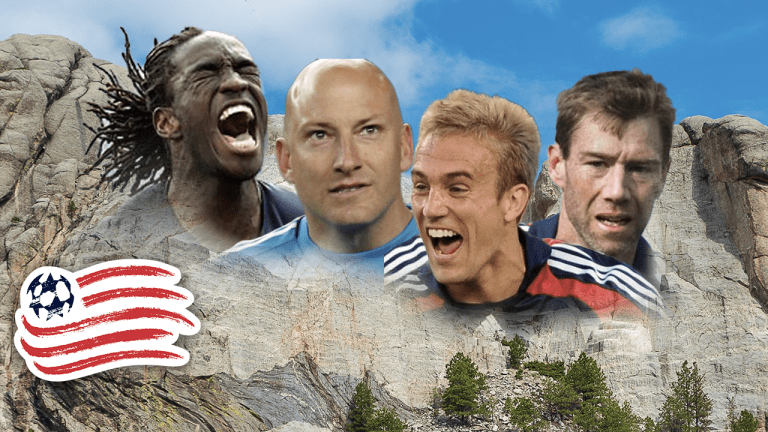
Taylor Twellman
When I think about the Revs, I think of Twellman and his goals (101 in 174 games), both in volume and in big moments. He was both ruthless and fearless in the box, and his career was ended far too soon by concussions. But my goodness, he accomplished plenty before hanging up his boots: MVP in 2005 (runner up in 2002), Best XI twice, MLS Cup finalist four times. The only blemish is that New England couldn’t get over the hump in the big game.
Shalrie Joseph
Nobody’s played or started more games for the Revs. Four Best XIs in five years. Seven-time All-Star. Three-time MLS Cup finalist. US Open Cup and SuperLiga champion. Joseph is one of the best midfielders in MLS history, and he’ll always be remembered as a Rev after giving New England nearly a decade of his life.
Steve Ralston
Ralston ought to be in the National Soccer Hall of Fame. He isn’t – not yet anyway – but he’s a shoo-in Extratime’s Revs Mount Rushmore (the Mutiny one, too). He was the complete package: productive (club assist leader, averaged more than five goals per season), durable (at least 20 GP in all eight years with the club), a quiet leader in the locker room (captain) and on the brink of an MLS Cup championship four times. He is one of the best passers this league has ever seen.
Matt Reis
One of the top goalkeepers in MLS history, Reis arrived in New England in 2003 and never left. Only Joseph has played more games for the Revs. He owns every single goalkeeping record and was at his best during New England’s best years (2005-2007). It wasn’t just on the field, either. the supporters loved him, and Reis loved Boston. If you don’t already know the story, read up on why Reis won 2013 MLS WORKS Humanitarian of the Year in his final year in MLS.
Colorado Rapids
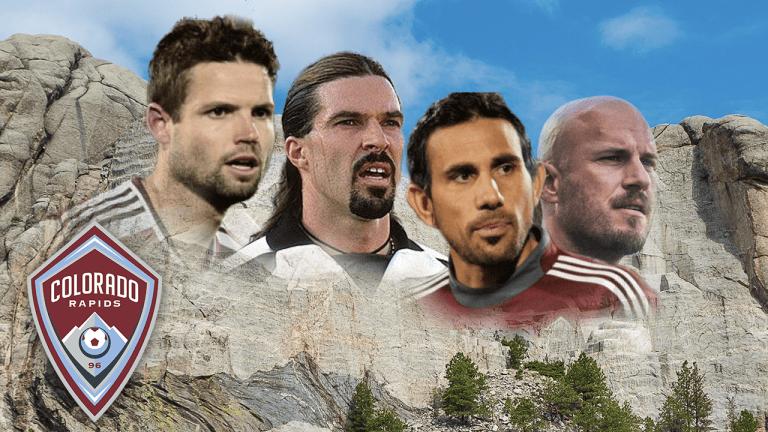
Marcelo Balboa
Clubs need icons, and Balboa was an icon. He may not be near the top in games played, but the 1994 World Cup star was the face of the Rapids during their first six seasons (and now far beyond). Whether in the backline or the midfield or in the community, he helped lay the foundation of the club. Oh, and you can never take this all-time great goal away from him, either.
Pablo Mastroeni
Nobody’s played more regular-season games (225) – in fact, nobody else has played more than 200 – in Colorado. More importantly, Mastroeni captained the MLS Cup-winning team (and coached the best regular-season Colorado team in club history). He was the Rapids rock for more than a decade.
Conor Casey
Nobody’s scored more goals in Rapids history. Casey’s form from 2008-2010 – 43 goals and an MLS Cup ring/MLS Cup MVP – makes him the most influential striker in Colorado history, by far.
Drew Moor
Should this spot belong to Chris Henderson? Yeah, maybe. We went with Moor because he played more games (196, second in Colorado history behind Mastroeni), won MLS Cup and will, in all likelihood, retire as a Rapid.
Portland Timbers
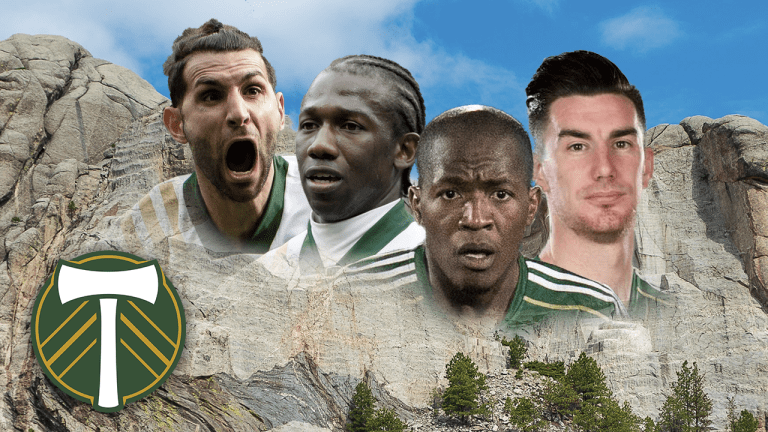
Diego Chara
The Colombian’s smiling face has been in the Timbers’ lineup since they arrived in MLS. Nobody’s played more games for the club (291 in all competitions), in any era. Chara’s one of the best defensive midfielders in MLS history, a guy who only started getting his due nationally after years of deep appreciation from the only opinions that really matter in this Rushmore exercise: those of his own supporters.
Diego Valeri
Talk about being beloved. The Argentine is the club’s all-time leading scorer, its talisman, it’s MLS Cup MVP, MLS MVP, three-time Best XI midfielder and four-time MLS All-Star. His family is embedded in the club, Timbers and Thorns, and the city. He’s the sort of player you build a statue of outside the stadium … or carve their face in fictional stone.
Darlington Nagbe
No, Nagbe is not a one-club man in MLS – Portland traded him to Atlanta United ahead of the 2018 season – but he’s the Timbers’ first SuperDraft pick (No. 1 overall), the only player not named Diego to make 200-plus appearances for the club and was one of the unquestioned stars of the team that brought MLS Cup back to Soccer City USA. He carried so much weight for those early teams.
Liam Ridgewell
Captain of the MLS Cup-winning team and a crucial piece in the MLS Cup runners-up run. Those are the two biggest moments in club history. Until someone guides the Timbers to moments that match those, it’ll be hard to push him off this list. A no-doubter, according to owner Merritt Paulson, who helped us narrow down the field on the pod.
FC Cincinnati
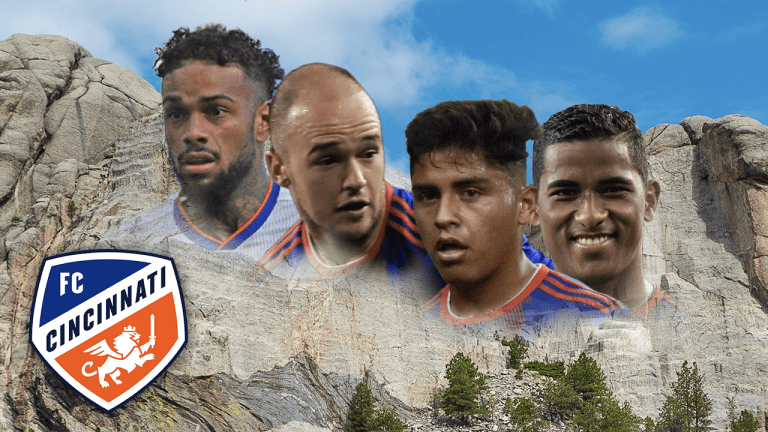
We gave Matt Doyle carte blanche here because, c’mon, it’s only been a year, and a disappointing one on the field at that. Carve these busts in soap. If all goes well, one or two will stick. Doyle, you’ve got the floor…
Jurgen Locadia
From a certain point of view, the best moment in Cincy’s MLS history came last month when, in spite of everything that’s already happened in his very brief MLS career, Jurgen Locadia said he hoped his loan deal – which technically expires this summer – becomes a permanent move. So an in-his-prime striker who sold for $20 million just two years ago wants to commit his future to you even in the very worst of times? Don’t just carve this guy’s face on Mt. Rushmore – make him king!
Allan Cruz
Allan Cruz is young, and energetic, and pretty skillful and miserable to play against no matter where he’s been lined up on the field. Even in the midst of 2019’s nightmare, he was mostly effective, and there were never any worries about body language or commitment. All of that made him probably the best player on last year’s team. Not a high bar, but still. I think in the long term, he’s going to be a very effective MLS player.
Frankie Amaya
One of the things I look for with young midfielders is “can they win the physical battle?” For most teenagers – especially teenagers who came through the ranks more as skill players than defensive presences – the answer’s usually “no.” For Amaya, the answer was “yes” a pretty staggering 60% of the time (his percentage of successful duels as a rookie), which is Ozzie Alonso/Diego Chara/Dax McCarty territory. Which is all by way of saying that Amaya’s going to become one of the better d-mids over the next half-decade. I am really, really looking forward to seeing what kind of partnership he and Cruz form.
Andrew Gutman
On Andrew Gutman’s second or third touch in his first-ever MLS appearance, he nutmegged the guy closing him down, carried the ball forward and then hit a very nice third-line pass. Eventually Cincy scored a goal. This was against the Crew in a rivalry game, and he was playing left back, and the dude just went out there and nutmegged people. How many left backs do that in their debuts? This kind of swagger must be appreciated. Put him on the mountain.
Philadelphia Union
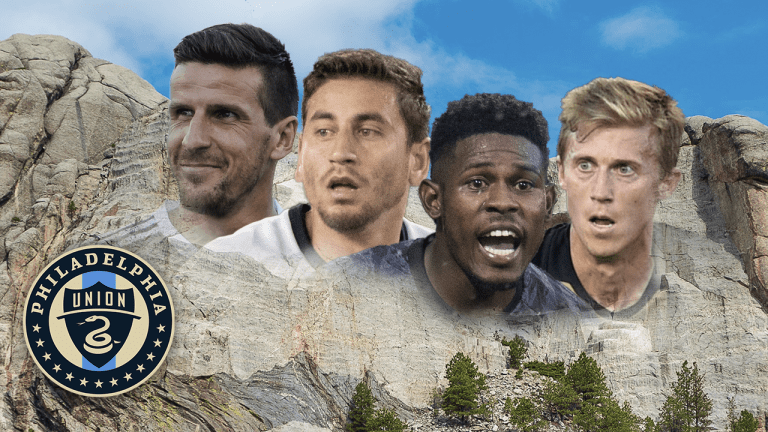
Sebastien Le Toux
The French attacker leads the club in goals and assists by a wide margin. He scored a hat-trick to beat D.C. United, 3-2, at Lincoln Financial Field in the Union’s first ever home game. He scored the club’s first playoff goal. His goals fueled two US Open Cup final runs. He became the face of the club over two stints and six years. The love between Le Toux and the supporters went both ways. He met his wife in Philly. He even signed a ceremonial one-day contract to retire as a Union player in 2018. His face is the first up in stone.
Brian Carroll
Only Raymon Gaddis has worn the shirt for more games and minutes than BC, a quiet but immense presence in central midfield and in the locker room for six of Philly’s first seven years, a run that included their first playoff appearance and two US Open Cup finals on the bank of the Delaware River. Someone’s got to set a club’s culture, and Carroll is a foundational piece of what the Union built.
Alejandro Bedoya
The Union signed Bedoya in the hope that his face would end up here someday. In Extratime’s estimation, the club’s current captain is already Rushmore worthy, for both past, present and future contributions. He’s already helped push Philadelphia higher than they’d been – read, regular berths and a first-ever playoff win – in the six years before the former Nantes, Rangers and Helsingborgs midfielder arrived. His legacy is still being written.
Andre Blake
Same for Blake, who is the only Union player not named Le Toux to be named to the MLS Best XI. The 2016 MLS Goalkeeper of the Year is the all-time leader in every statistical category at the club. If you listened to the podcast, the Jamaican got Jim Curtin’s vote, and we can’t really go against that.
Montreal Impact
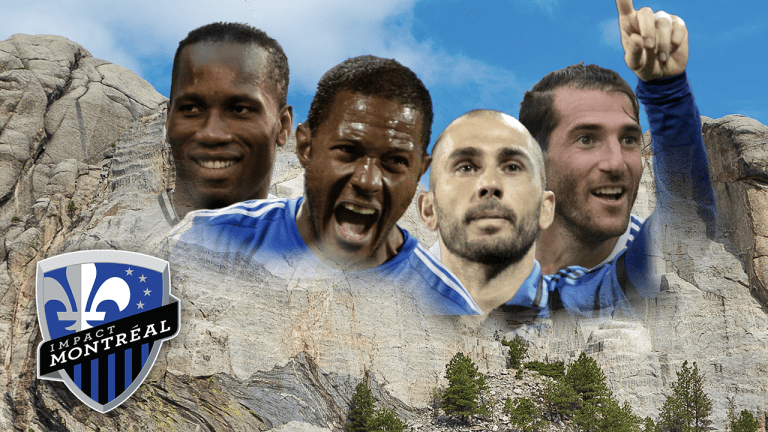
Patrice Bernier
He’s a local boy and Canadian international who straddles both the A-League and MLS eras. Nobody’s played more games for the Impact in the latter than Bernier, who captained his hometown team during its most successful run in MLS (CCL Final, Canadian Championship, Eastern Conference Final). A true icon.
Ignacio Piatti
Forget Impact history, Nacho is one of the best attacking players in MLS history. Woe to all defenders who found themselves isolated in space against the Argentine, who was a three-time All-Star and named to the MLS Best XI twice during his five-and-a-half years in Montreal. He nearly won the Impact a Concacaf Champions League. He was a terror in the 2016 MLS Cup Playoffs run. Third all-time in MLS games, first in goals, first in assists, first in our hearts.
Marco Di Vaio
The Italian poacher was the piece that pushed the Impact into the playoff picture and opened the door for players like Piatti, Alessandro Nesta and Didier Drogba to join the club. His stint was short, but his goals were plenty, including 20 in the 2013 season. He was the face of the club the moment he signed halfway through 2012, the bridge to even better years down the line.
Didier Drogba
Who cares how long he played in Montreal? Just about every minute of it was special, from the time he landed to adoring crowds to his departure 18 months later. That hat-trick in his first MLS start? Par for the course, especially early on. Drogba lit MLS on fire during the second half of 2015, 11 goals in 11 games. He scored big goals to beat Toronto FC, in the regular season and in the playoffs, knocking the Impact’s rivals out of the 2015 playoffs. In 2016, Montreal were a break or two away from MLS Cup. It’s no exaggeration to say he changed the club.
FC Dallas
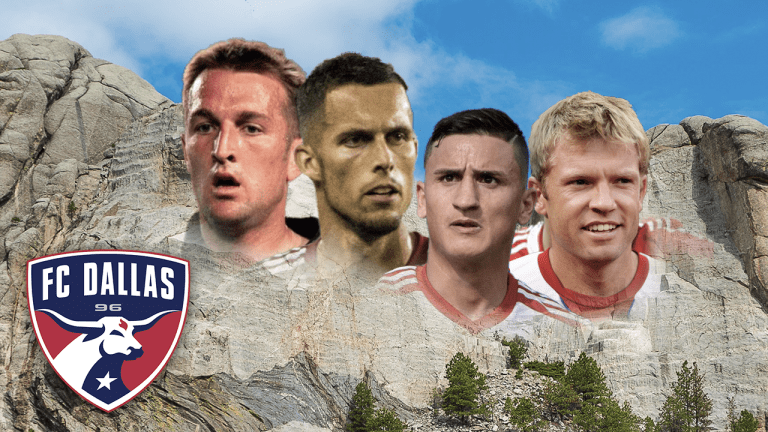
Important caveat to start: We named Oscar Pareja our all-time FC Dallas head coach, which he absolutely deserves. We did this to honor him for his contributions to the club, but also to open one more spot in the pantheon for another deserving figure. On playing career alone, Pareja should be on this Mount Rushmore. Period.
Jason Kreis
Most goals. Most assists. Second most games played. MLS original who scored the first goal in club history. Golden Boot winner. First MVP in club history. You start here, with Kreis and the Dallas Burn.
Matt Hedges
Captain. Longevity. Loyalty. Supporters’ Shield. US Open Cup. Look at an FC Dallas lineup for the past eight years, and you’ll find Hedges in the back, likely captaining the team. Nobody’s played more games for the club. He’ll pass 300 before his career is done.
Bobby Rhine
He was never the best player on the team. He wasn’t a shoo-in starter, even. But Rhine represented FC Dallas for a decade and beyond until his death in 2011. I can’t do the man justice in a paragraph. To truly understand why we – and Reggie Cannon, who joined us for the pod – chose him for our club pantheon, I highly recommend this remembrance from MLSsoccer.com’s The Word series by Nick Firchau two years after Rhine died from a sudden heart attack at age 35. There’s more to a career than statistics or trophies.
Mauro Diaz
I, Andrew Wiebe, preferred David Ferreira for this spot. You don’t leave one of two MVPs and an MLS Cup finalist off Mount Rushmore. But Matt Doyle insisted, and he made a compelling case. Diaz was the best player on the club’s best team (2016’s Shield and USOC winners). He was a magic man, putting up a goal or an assist basically every 90 minutes he played. Had he not gotten injured in 2016, they would have been favored to win the first ever treble.
Orlando City SC
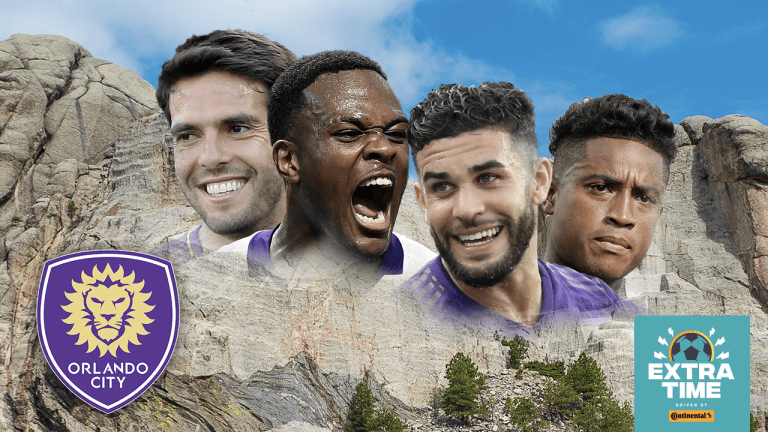
Kaka
Three years, 75 games, 24 goals, 22 assists, zero playoff appearances. The Brazilian is, far and away, the biggest figure and best player in club history. Besides, no Orlando City player has a playoff appearance, so zero demerits there. As David Gass suggested, perhaps we should enshrine Kaka, then cover the other cliffs with The Wall. The supporters have earned it for their steadfast loyalty, and it’d give the club time to build some more history.
Cristian Higuita
Every spot from here on out is simply sketched out. Wouldn’t want to put something in stone too soon, but this is a nice stat.
Dom Dwyer
We said we wouldn’t do it, but this is based on more than MLS. Dwyer’s USL contribution to the club – scorching regular season until Sporting KC recalled him from his loan and four goals in the final to win the USL Pro championship in 2013 – is part of the logic here. His big-money return to Orlando in 2017 started well, but 2019 was a bump in the road. Still, he’s half of arguably the biggest soccer in the world, with Sydney Leroux wearing purple too for the Pride.
Cyle Larin
Orlando City supporters are probably going to hate us for this, but the man is the club’s all-time leading scorer. He’s the second most important player in club history behind Kaka. Yeah, it ended badly, but you can’t deny what the Canadian forward did on the field.
Seattle Sounders FC
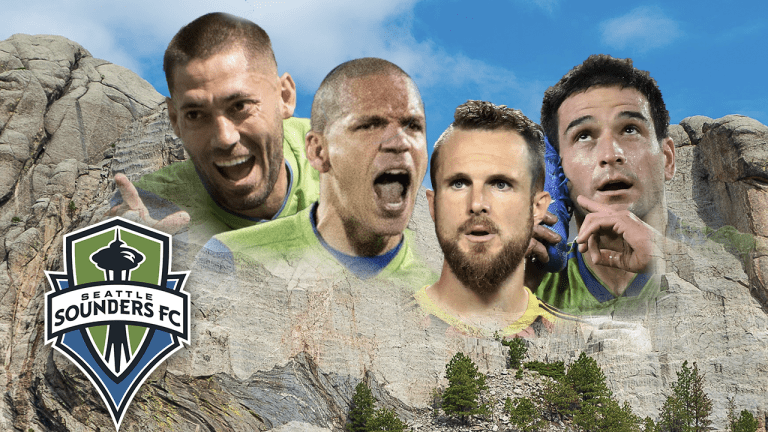
Osvaldo Alonso
Ozzie is the first face chiseled somewhere high above Puget Sound. He spent 10 years with the Sounders, and the supporters affectionately called him Honey Badger for a reason. The dude was/is relentless, and he’s never seen a tackle or a 50-50 that didn’t suit him. Alonso helped put Seattle on the MLS map and became one of the best defensive midfielders the league has ever seen. You can’t argue with one MLS Cup, one Supporters’ Shield and four US Open Cups and most MLS appearances in club history.
Nicolas Lodeiro
Before the Uruguayan arrived, the Sounders were the “almost” team. Big budget, big expectations, big failures in the playoffs. Lodeiro changed that. He dragged the team back from the dead and into playoff contention after arriving in the summer of 2016. Spoiler: Seattle made the playoffs and then won their first MLS Cup. Three years later, they did it again. Three MLS Cup finals in four years is pretty good. Other than his half season in 2016, Nico’s put up at least seven goals and 12 assists. He’s the Sounders’ all-time assist leader, and he’ll only add to that resume.
Stefan Frei
The Sounders don’t win their first MLS Cup without the most iconic moment in club history: Frei’s miracle save on Jozy Altidore. We’re at six years and counting with the Swiss goalkeeper between the posts, and it doesn’t look like that will change anytime soon. He should have won an MLS Goalkeeper of the Year award during that time, but two MLS Cups, an Open Cup and a Shield plenty makes up for it.
Clint Dempsey
There was real debate here. Since Chad Marshall is already on the Crew pantheon, we decided this spot would go elsewhere. Fredy Montero has a solid case. Brad Evans does too. Zach Scott was the soul of the club for a long, long time. Jordan Morris and Cristian Roldan will eventually push to be included. For now, it’s Dempsey. His arrival and the ambition it showed vaulted the Sounders up a notch as a club and helped turn a very good team into a consistently great one.
Chicago Fire FC
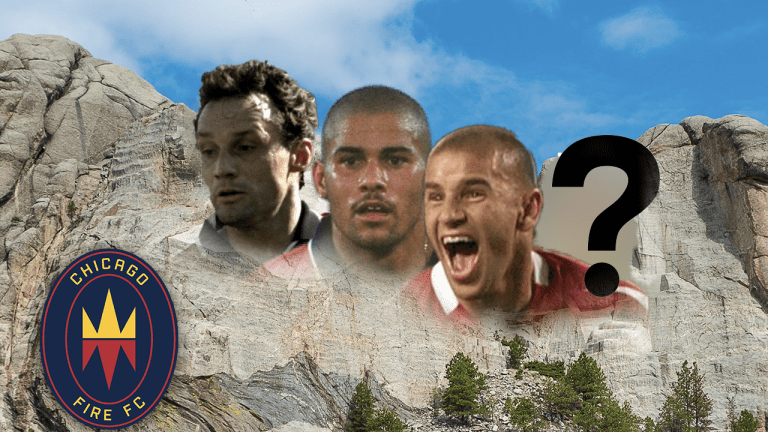
Piotr Nowak
Nowak was the best player on the Chicago Fire teams that took MLS by storm, winning the double in their first season (1998) and, if not for two MLS Cup defeats, very nearly the second dynasty in MLS history along D.C. United. How’s this for a five-year run? Three-time Fire MVP, three-time MLS All-Star, three-time MLS Best XI and 1998 MLS Cup MVP. In Chicago’s pantheon, you start with Nowak and go from there.
Chris Armas
Right after Nowak is Armas, arguably (probably?) the best d-mid in the history of this league. Ozzie Alonso made the Best XI once. Armas was on the team four years in a row (1998-2001) and it likely would have been six times consecutive had he not been injured in 2002. If not for the ACL tear, he’d have been on that magical 2002 World Cup team, too. Once he got to Chicago, he never played for another club. He was there for every single trophy the club’s ever won.
C.J. Brown
Nobody has played more games (296) for the Fire than Brown, who spent his whole MLS career in Chicago. From 1998 until 2010, you could find him in central defense, making opposing forwards cower and taking the club’s young players under his wing. He was the last remaining Fire original when he retired in 2010. He was never the best player on the team, but he was ever-present and anyone who knows the club intimately will tell you he belongs in the pantheon.
Cuauhtémoc Blanco
Ante Razov is the leading scorer in Fire history. He was there for all but one US Open Cup win. Zach Thornton was a beast between the pipes, and absolutely deserved a shout. Blanco is a legend, the face of the team from 2007-2009 and one of the best players in MLS during that time. We put it to a vote, and it wasn’t really close. For what it’s worth, Calen Carr agreed with the outcome.
New York Red Bulls
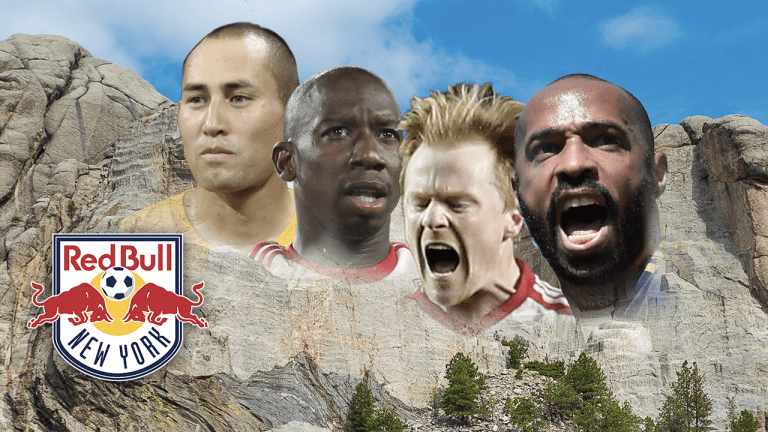
First, a personal disclaimer: I am uncomfortable with the fact that there are no Metro legends on Extratime’s Mount Rushmore. Is it recency bias? Are the recent crop of Shield-winning stars simply more influential? All four of our choices deserve their spot, but I can’t help but feel that Gio Savarese, Tony Meola, Tab Ramos, Clint Mathis, Tim Howard, Mike Petke, Amado Guevara got overlooked. Can’t do much about that now.
Thierry Henry
Third all-time in goals scored behind Bradley Wright-Phillips, whose Red Bulls career he helped launch, and Juan Pablo Angel. Captain of the team that won the first trophy in club history, the 2013 Supporters’ Shield. Just a legend in every sense of the word. He helped lay the foundation for what the club would become in the second half of the decade.
Bradley Wright-Phillips
Nobody expected much when BWP signed a short-term deal with the club in the summer of 2013. Wright-Phillips had a famous last name and some decent seasons in the Championship and League One, but nobody could have predicted what happened next. He tied the then single-season goal record (27) in his first full season. He scored 15-plus goals for five straight seasons. He won three Supporters’ Shields. He connected with the supporters. He has more than twice the number of goals of any other player in club history.
Luis Robles
Seven years between the pipes, the first five of which were without a single day off. He is the club’s unquestioned iron man, the steadying presence in net for all three Shields and the best years in Red Bulls history, by far. He won a Goalkeeper of the Year award in 2015, and, like BWP, he was something of a reclamation project. Robles was considering walking away from the game before he cemented himself in history. Nobody has played more games for the club.
Dax McCarty
We filled the final spot in the pantheon with McCarty, the third player on this list to leave the club on terms that weren’t of their choosing. That’s the Red Bulls way, both in this era and the early years, so you can’t count it against McCarty, Robles or Wright-Phillips. We considered Sacha Kljestan for this spot. Juan Pablo Angel, too. Thought about some of the old Metrostars legends as well. McCarty gets it because, along with Robles, he bridged the gap between the Petke/Henry era and Jesse Marsch’s pressing teams. He was the captain of that brilliant 2015 team, and fiery presence who embraced and was embraced by the South Ward.
New York City FC
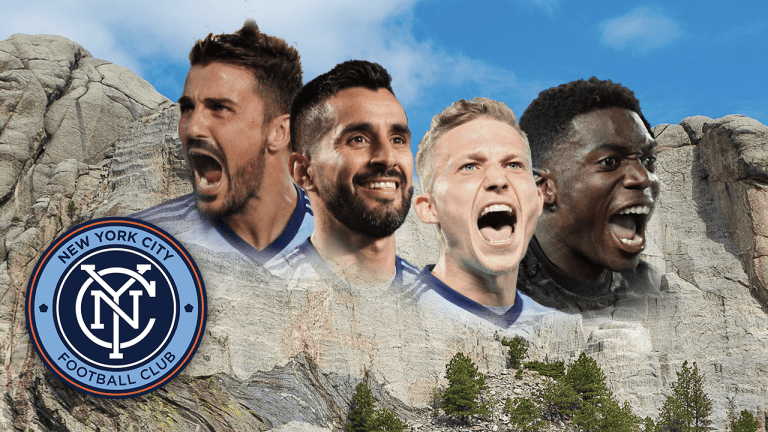
David Villa
First Designated Player. First captain. Landon Donovan MLS MVP. He scored 80 MLS goals in four years, setting club records for goals and appearances. He helped turn the club around with the help and vision of Patrick Vieira. He lived in the city, and made being a New Yorker part of his identity. He’s a no-brainer.
Maxi Moralez
The Argentine No. 10 represents the moment the club decided their star-studded DP policy (Villa, aside) just wasn’t working. So they signed Moralez from Leon, which turned out to be a masterstroke. He arrived before the 2017 season, and his goals and assists helped NYCFC become one of the best teams in the league: 57 points, 56 points, 64 points.
Alexander Ring
He may not be the flashiest choice, but when the club needed substance to turn the corner, they looked to Ring. Like Moralez, he represents a turning point as far as transfer policy and results. He has a chance to go down in NYCFC history as the club’s all-time appearance leader. He’ll just have to stick around as long as our final choice…
Sean Johnson
Right now, NYCFC is a little short on history and we expect Johnson to be there when the club finally gets a trophy. They’re good enough, no doubt, and their goalkeeper is one of the best in the league, no doubt. Since arriving ahead of the 2017 season, Sean John has become one of the voices of the club. His place in the pantheon will only solidify as the years go on.
San Jose Earthquakes
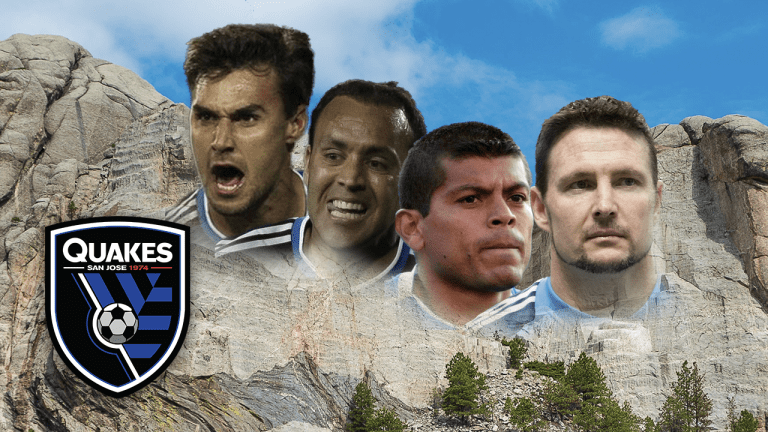
Chris Wondolowski
You’ve got Wondolowski, then you’ve got everyone else. His underdog-to-all-timer story perfect in every way… Local boy, all-East Bay to Chico State. Supplemental draft pick by the Quakes in 2005. Barely played. Packed up and moved with the team to Houston a year later. Four years and four goals with the Dynamo, where he was the reserve league goal king. Traded back home to San Jose. Out-of-the-blue Golden Boot. Two years later, 27 goals and a piece of Roy Lassiter’s single-season goal record. MVP winner. Supporters’ Shield winner. Face of the Goonies. Repped the Bay in a World Cup. A decade of double-digit goal seasons (and still counting). The league’s all-time leading goalscorer.
He’s THE club legend, the sort who rips his shirt off in the supporters’ section when he’s suspended and can’t play. Put four busts of Wondo up on the Quakes’ Rushmore, and I don’t think you’d get many complaints.
Ramiro Corrales
Joining Wondo is the man who passed him the captain’s armband. Corrales is from an hour south of San Jose, a teenage MLS original who started his career with the Clash, bounced around for a few years and returned to NorCal to win two MLS Cups and a Shield with the Quakes in 2001 and 2003. After a couple of years in Norway, the left back came back to San Jose for the team’s return to MLS and didn’t leave until he retired in 2013. In all, he spent 12 years representing the club. He is, and forever will be, El Capitan.
Ronald Cerritos
The final two spots were hotly debated. I’m not sure there’s a right answer. Landon Donovan is the most talented player in club history, but he’s not exactly a fan favorite anymore. Jeff Agoos was part of the D.C. glory years, sure, but he captained the Quakes to both of their MLS Cups. Dwayne De Rosario is just as closely associated with the Dynamo. John Doyle and Troy Dayak are both Bay Area legends. Richard Mulrooney gave his heart and soul to San Jose. Ronnie Ekelund isn’t talked about enough in MLS history. Shea Salinas is San Jose TID. In the end, we went with the club’s second all-time leading scorer in
Cerritos, who was a Best XI attacker in the early years – four double-digit goal seasons in five years – and won an MLS Cup and Shield with the club. He’s still first in club history with 47 assists, too.
Joe Cannon
Between Cannon, Pat Onstad and Jon Busch, you can’t really go wrong with Quakes goalkeepers. We went with Cannon because he leads the club in the big statistical categories, was in net for the first MLS Cup win, won Goalkeeper of the Year in 2002 and always seemed to naturally connect with the supporters and the club. Did I mention he’s another local? There’s just something about Bay Area boys playing for their hometown club.
Columbus Crew SC
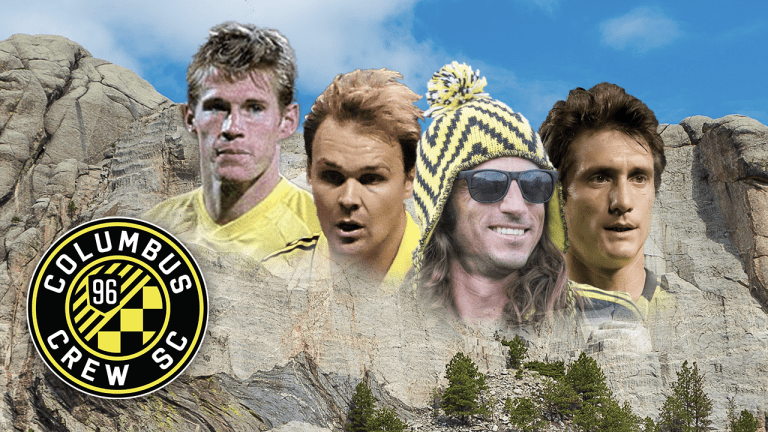
Guillermo Barros Schelotto
Bow down. There’s nobody in Crew history quite like GBS. He’s the talisman, even if he was only around for three-and-a-half seasons. The Argentine is the untouchable one in club lore. The MVP. The Nordecke’s obsession. Columbus was fighting its way out of mediocrity when the Boca Juniors No. 10 arrived in the summer of 2007. By 2008, they were the class of MLS, with a Supporters’ Shield and MLS Cup double inspired by the league’s best player. Schelotto doesn’t top the club’s statistical charts, but he’s No. 1 in many hearts.
Chad Marshall
So far, we haven’t doubled up. Landon Donovan isn’t on both the Galaxy and Quakes Mount Rushmore, for instance. Same for DeRo with Houston and San Jose. That’s going to be put to the test when we get to Seattle because Marshall absolutely has to be immortalized in yellow and black. No player has appeared in more games for the Crew. He was there for three Shields and MLS Cup. He was a two-time Defender of the Year in Columbus. The Sounders have a claim to him, too, but Marshall’s time in Ohio can’t be forgotten.
Brian McBride
The names we chose for the final two busts jump off the page, but Columbus’ history has so many protagonists that I feel guilty for leaving them off. Robin Fraser. Robert Warzycha. Pipa Higuain. Jeff Cunningham. Eddie Gaven. Wil Trapp. Stern John. All deserving candidates, but we went with McBride thanks to his founding place in club history. He’s still the Crew’s all-time leading scorer in all competitions, and spent seven years in central Ohio (1996-2003) before moving to England. If you were building the club’s all-time XI, he’d be the No. 9.
Frankie Hejduk
When Hejduk’s place in the pantheon isn’t 100 percent certain, you know the club has a rich history. But how on earth could you possibly leave him off? Others may have played more games for the Crew, but nobody made the same impression. He was there for all the biggest moments in club history, as a player and later in the front office. He was arguably the best right back in the league. He was the captain of the MLS Cup winners. He’s Frankie!
Atlanta United
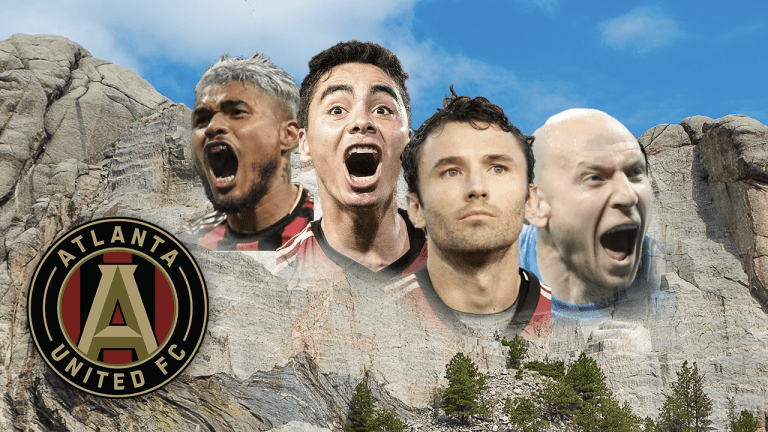
Josef Martinez
He’s the soul of the club, and I hope the sculptor is already working on Martinez’s signature scowl. Imagine this 60-foot tall bust staring down at you from above ...
Playing angry works for Martinez: 77 MLS goals in 84 games played, 2018 Landon Donovan MLS MVP. He will turn 27 in May. The Venezuelan’s recent knee surgery went well, per the club, and he’s already on the mend. If he plays five more seasons in MLS, I can’t see how he won’t be the league’s all-time leading scorer (if that comes to pass, the Five Stripes will have many more trophies in the cabinet, too).
And if, for whatever reason, none of that comes to pass, Josef would still be here. He, more than any other player, represents Atlanta United.
Miguel Almiron
Almiron is a close second, the smiling half of Atlanta United’s Dragon Ball Z-inspired fusion celebration. Two years, two Best XI selections for the Paraguayan, arguably the best individual player in MLS in 2018. So good that Newcastle United broke their transfer record to sign him a year ago. Like Martinez, there’s a bond between Almiron and the supporters and the city that can never be broken. Atlanta’s history is his history.
Michael Parkhurst
Here’s where it starts getting tricky. The list of potentially deserving names is long: Parkhurst, Brad Guzan, Julian Gressel, Leandro Gonzalez-Pirez, Tito Villalba, maybe a Miles Robinson futures play.
We went with the first-ever club captain, whose timely tackle created the MLS Cup game-winning goal. Atlanta might have won another one, too, had Parkhurst’s dislocated shoulder not thrown off the conclusion to his long and storied career in 2019. No matter how it ended, he led the club to three trophies in three years and retired in the colors.
Brad Guzan
This was the great debate. Matt Doyle argued, despite the trade this offseason, that this spot ought to belong to Gressel, who grew into a foundational piece on and off the field in Atlanta. He didn’t want to move, after all.
What tipped the scales was Guzan’s past, present and, crucially, future with the Five Stripes. He’s absolutely deserving based on only what he’s already done between the posts and how he’s represented the community upon his return to MLS, but we calculated that his future contributions would make this feel like the correct choice down the line.
Real Salt Lake
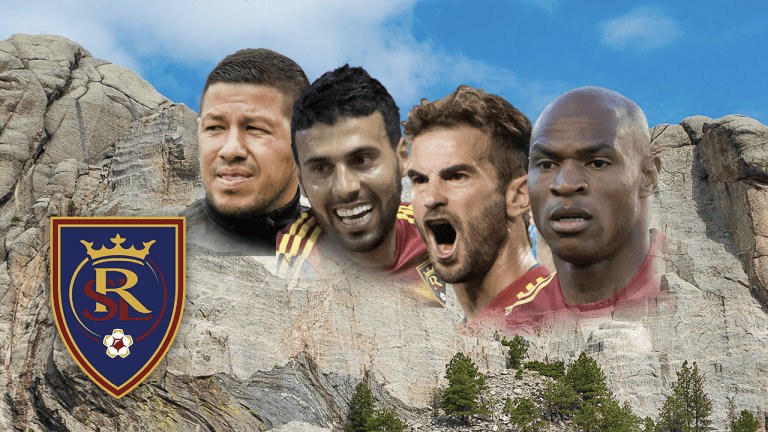
Kyle Beckerman
The first three names write themselves, starting with Beckerman. You can argue that the trade that brought the defensive midfielder to RSL was the move that began the club’s transition from expansion side to bonafide contender. It took him less than a year to become captain and he’s been there ever since, for every win, every trophy and every big moment in club history. The dreads (immortalized in stone). The diamond. The CCL final run. The World Cup star turn.
Nick Rimando
Everything I said about Beckerman applies to Rimando, too. He spent 13 years (2007-2019) as the club’s starting goalkeeper. Nobody has played in more MLS regular-season games (514), and the only player who is close enough to catch him is Beckerman (488, all-time record for field players). He never won an MLS Goalkeeper of the Year award, but he might be the choice for an all-time MLS XI. As a distributor and shot-stopper, he may have no equal in this league.
Javier Morales
I encourage you to listen to the section of our Extratime interview with Nat Borchers (available below), who explains why Morales is the best No. 10 he’s ever played with, including Diego Valeri. Javi Mo was a two-way player, terror in transition, dead-ball artist and perennial MVP candidate. RSL’s diamond worked because they had Morales at the point. He made his home in Utah and he helped make the club one of the best in the league from 2009-2014.
Jamison Olave
On the pod, Borchers argued this spot belongs to Tony Beltran. That’d be a fine choice. Beltran is one of the most underappreciated outside backs in MLS history, spent his whole career in Utah and still works for the club. He was there for all the big moments. You can also make a compelling case for Jason Kreis, Borchers, Brian Dunseth, Andy Williams, Chris Wingert and Alvaro Saborio.
We settled on Jamison Olave to fill out the Claret-and-Cobalt pantheon. Why? Because RSL’s glory years aren’t the same without one of the most feared defenders in MLS history. Olave was an absolute beast, a combination of size, strength, speed and fearlessness that made him a Best XI player and the 2010 Defender of the Year. The Colombian also gets bonus points for coaching the Real Monarchs to a USL Championship.
Vancouver Whitecaps
We limited consideration to the club’s MLS history.
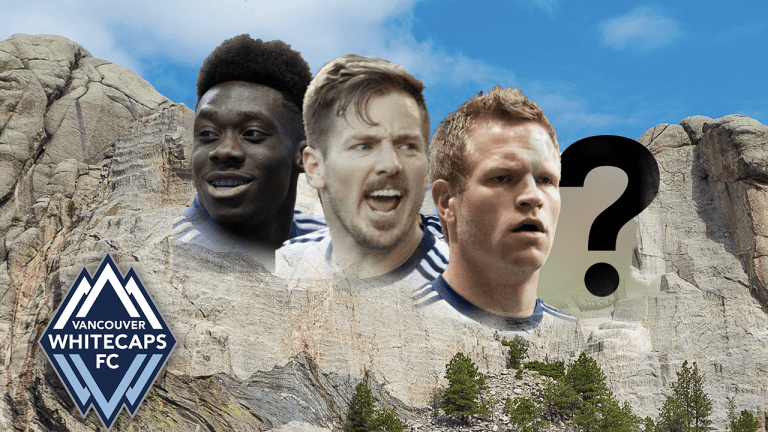
Alphonso Davies
His time with the first team was short, but you can’t punish Davies for his brilliance. Academy player turned teenage star turned Canadian international turned record transfer to Bayern Munich turned one of the best left backs in the world. Davies is the most talented, memorable player in ‘Caps history, and he’s one of their own!
Jordan Harvey
The left back arrived in Vancouver halfway through their first MLS season and stayed for seven years and 199 appearances, the most in club history. He won a Canadian Championship, played on four playoff teams and helped the ‘Caps to the Concacaf Champions League semifinals.
Jay DeMerit
The past is a little murky now, but DeMerit was the first signing and first captain in Vancouver’s MLS history. He joined the club on the back of the US men’s national team’s run in the 2010 World Cup. He was a Premier League player with a big personality, on and off the field, and started 53 games for the club in their first two seasons before injuries ended his career two years later. He married a Canadian Olympic Gold Medalist. He still resides in the area. And he’s a club legend, even if the results weren’t always legendary.
Russell Teibert
We put this to a vote. The Homegrown midfielder, Canadian international and soon-to-be club appearances leader who’s been there since the MLS era began won the vote, as it should be.
LAFC
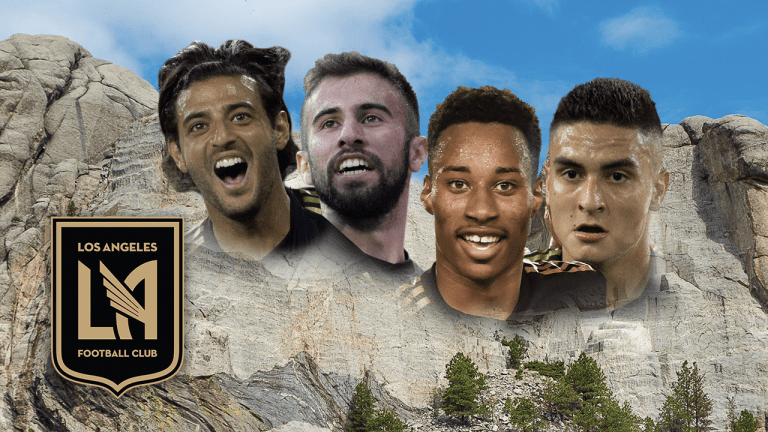
Carlos Vela
Might as well just carve Vela’s face in the granite four times. He is LAFC’s Lionel Messi, no exaggeration. There’s a ho-hum, this-is-just-what-I-do absurdity to 52 goals and 30 assists in 64 games. It’s not fair. Vela is the sun, and the Black and Gold universe revolves around him. No wonder they couldn’t possibly part with him, even for a four-month loan spell at Barcelona.
Diego Rossi
Vela’s blinding brilliance can sometimes obscure what the 22-year-old Uruguayan’s accomplished in his first two MLS seasons. No shame in being the second-leading scorer in club history (30 goals, 18 assists in 71 games). No shame in eventually moving on, either. That’ll be part of Rossi’s legacy in Los Angeles. He came, he saw, he scored goals and, eventually, he will be sold for big bucks that will be reinvested into the club.
Eduard Atuesta
LAFC’s history is brief, so any player who is Best in Show at their respective position ought to be on the club’s Mount Rushmore. Atuesta was the best defensive midfielder in MLS in 2019. Like Rossi, he’ll almost certainly be part of the foundational generation of South America prospects who establish the club as a pathway to trophies in MLS and future transfers to Europe.
Mark-Anthony Kaye
Here’s where it got a little harder for us. Latif Blessing was in the running. So was Zimmerman despite the preseason trade to Nashville SC. Eddie Segura is a good bet for future consideration. We went with Kaye because of what he represents: a previously undervalued player who developed into an all-league performer under Bob Bradley’s guidance. Personality matters, too. The Canadian international often serves as an emotional barometer on the field, good or bad.
LA Galaxy
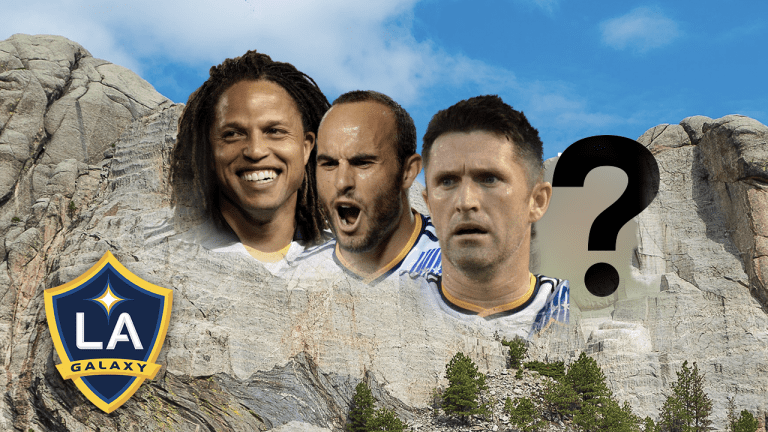
There were three no-doubt choices for us, and then it got tricky ...
Cobi Jones
When you play a record 392 games for your hometown club, sit third on the all-time goalscoring chart (82) behind only Landon Donovan and Robbie Keane and win two MLS Cups, two Supporters’ Shields and two US Open Cups, your face lives on forever in rock. Jones and the Galaxy was the perfect marriage for player and club from the time MLS first kicked a ball in 1997 until 2007. He had personality, he was a US men’s national team star and he is one of the Galaxy’s own.
Landon Donovan
I feel like I’d be wasting my breath making the case. If you don’t already know, fire up Google and do the research. Let’s just make sure the bust looks good and call it a day. #LegenD
Robbie Keane
Keane was the swaggering scalpel for some of the best teams in MLS history. I say scalpel because he was so precise in the way he carved up, well, basically everyone. The goals, the assists, the somersaults, they all felt inevitable during those big-three Galaxy years. Until Josef Martinez arrived, Keane was arguably the most lethal scorer in the history of the league (.69 goals per 90). This spot is a battle between Keane and Carlos Ruiz, in my opinion, and the Irishman’s run was longer and more decorated.
David Beckham
This is where it got a little contentious. Charlie Davies couldn’t fathom putting any other face but Beckham’s on the Galaxy Rushmore. I couldn’t see how it could be anyone other than Mauricio Cienfuegos joining Jones, Donovan and Keane. So we put it to a vote, which I now realize was a mistake. Nobody is gonna win a Twitter popularity contest against the most famous soccer player of all-time.
For what it is worth, I absolutely get the case for Beckham. His presence alone elevated the Galaxy and MLS to another stratosphere, and he won two MLS Cups. Keane probably doesn’t end up in Los Angeles without Beckham. I’d argue the Englishman belongs on the MLS Mount Rushmore, but another face from an earlier iteration of the Galaxy ought to be on the club’s slab of rock ...
Honorable Mention: Mauricio Cienfuegos
For me, alongside Jones, Cienfuegos represents the soul of the club. I say give the man the respect he deserves and immortalize his contributions. The Salvadorian’s resume is impeccable, if largely overlooked by recent arrivals to MLS fandom. Well, let’s celebrate our history. Three Best XIs, one US Open Cup, two Shields and the 2002 MLS Cup that finally got the previous almost-but-not-quite Galaxy over the championship hump. Ask old school LA supporters. They’ll tell you.
D.C. United
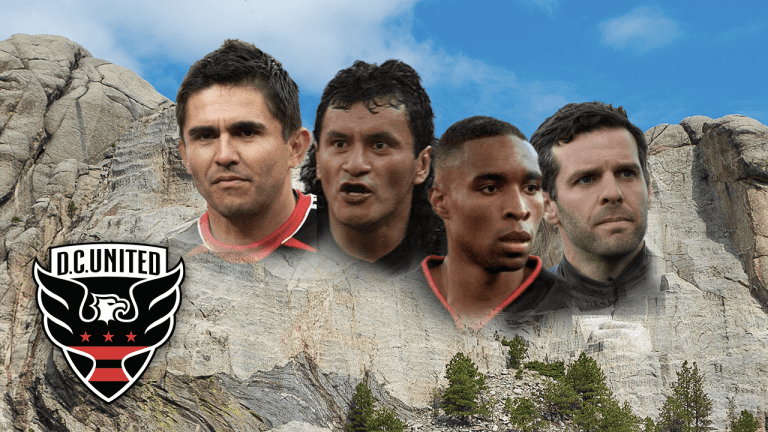
Jaime Moreno
D.C. United are not D.C. United without their Bolivian talisman. He’s the club leader in games (329), goals (131) and assists (102), one of only two MLS players to hit the century mark for both goals and assists. More importantly to this exercise, Moreno was the ever-present face of D.C. (well, apart from that short stint with the MetroStars) for 12 of the 13 trophies in club history. Legend personified.
Marco Etcheverry
"El Diablo" is the best player in D.C. United history — in my opinion, but you’d be hard-pressed to find someone close to the club who disagrees — and arguably the most talented No. 10 in league history. From 1996 to 1999, the Bolivian was absolutely absurd (21 G, 66 A in the regular season and 3 G, 13 A in the playoffs) as the club won three MLS Cups, two Supporters’ Shields, a US Open Cup and the Concacaf Champions Cup as well as Copa Interamericana.
Eddie Pope
At his peak, Pope might have been the best defender in MLS history. I only say “might” because I don’t really feel like litigating the all-time list right now. It doesn’t matter. He was that good. Go back and watch the tape, both with D.C. United and the US men’s national team. Injuries disrupted his career at times, but he scored trophy-winning goals and stopped them on the other end of the field.
Ben Olsen
Choosing a fourth for D.C. was an impossible task. We went with Olsen after much discussion because of, at this point, his lifetime of service, both as a player and a coach. He lives and raises his family in the District. He’s Black & Red through and through, even if the supporters haven’t always been in love with his methods on the sidelines. Other candidates: Christian Gomez, Raul Diaz Arce, Bill Hamid, Jeff Agoos.
Toronto FC
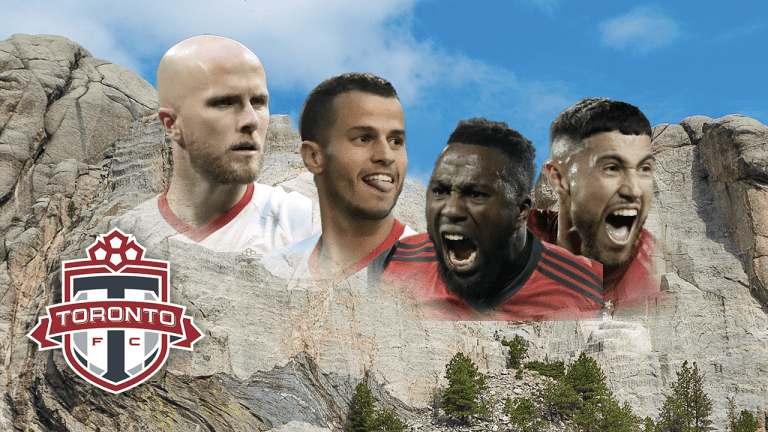
Michael Bradley
There are two distinct on-field eras for Toronto FC: dumpster fire and model, trophy-winning club. Credit to Tim Leiweke and Tim Bezbatchenko for the Bloody Big Deal shift, but none of it would have happened without Bradley taking a chance and making the jump to the True North. The trophies, the all-time seasons, the CCL run speak for themselves, but it’s the words of the supporters that truly express his place in club history: Your city. Your legacy. Our captain forever.
Sebastian Giovinco
Until Carlos Vela showed up, no player in MLS history could sniff the Atomic Ant’s single-season brilliance. He changed the league in 2015, no exaggeration. Bradley was the rudder of the ship, but Giovinco was the wind in the sails as Toronto FC transformed themselves and made history by winning the treble in 2017 then nearly making CCL history the next spring. That free kick against Tigres ... still one of my favorite MLS moments ever!
Jozy Altidore
Quick, who was Toronto FC’s most impactful player during that 2017 MLS Cup run? You can probably guess who I think it was. Injuries have sometimes kept Altidore from being at his unplayable best up north, but there’s no doubt he’s one of the three central figures that transformed the club and finally made Toronto winners in MLS. He can be a divisive figure, but there’s no doubt Altidore’s face ought to be carved in stone for the Reds.
Jonathan Osorio
In the words of Matt Doyle, “Nobody from the era of losing can be considered.” Osorio straddles the divide, but you can’t count it against him. The Pride of Brampton was Extratime’s choice — over Dwayne De Rosario, Maurice Edu, Danny Dichio, Terry Dunfield and Jim Brennan — because of what he represents: the city and the club at the deepest level. You’ve got to have a Canadian here, and Osorio is already the all-time appearance leader, with some massive goals in big moments to remember as well.
Houston Dynamo
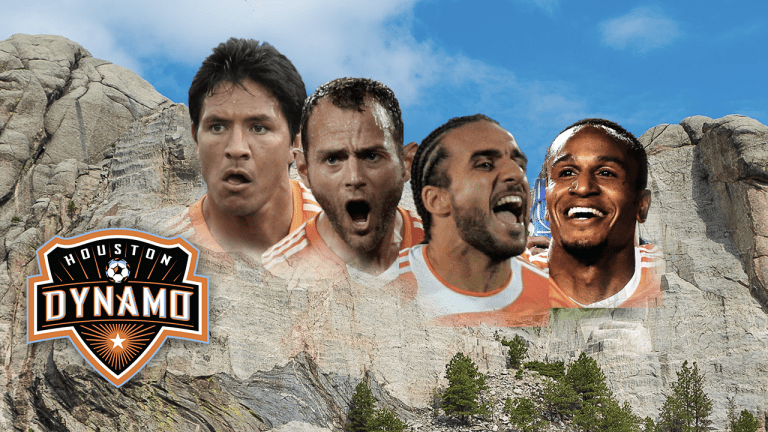
Brian Ching
We let Calen Carr lead all Dynamo decisions — it only seemed fair – and The Big Kahuna was the first name he added to the list. Ching was more than just a scorer. He was a facilitator. A tone-setter. A security blanket. A big-game player. He’s also still in Houston, the same rock in the community that he was during his playing days (two MLS Cup wins, two runners-up). As a player and as a man, he’s a shoo-in here.
Dwayne De Rosario
Two MLS Cups in back-to-back years immediately upon moving to Houston. That doesn’t happen for the Dynamo without DeRo, MLS Best XI in both of the 2006 and 2007 championship seasons. He was an icon, both for the golazos and the celebrations that inevitably followed. You could argue for De Rosario’s inclusion on San Jose's and Toronto’s Mount Rushmore, but you can’t argue with the collective results in Houston, where he was unquestionably the club’s best player at their peak.
Brad Davis
Davis is destined to be underappreciated, just like Steve Ralston before him, despite being third all-time in MLS assists. He was much more than a cultured left foot, though that’s what jumps to mind for many. An important member of the MLS Cup-winning teams, he took on more responsibility following DeRo’s departure and was a regular All-Star and 2011 MVP candidate in the years that followed. He’s a big reason the Dynamo were at the top of the league for years.
Ricardo Clark
Stu Holden. Eddie Robinson. Pat Onstad. Geoff Cameron. Bobby Boswell. Wade Barrett. Boniek Garcia. There are lots of names that deserve a shout, but we picked Ricardo Clark, who was there for almost all the good years — a European move broke up his run in Houston – and some lean ones, too. Like Davis, he’s destined to be underappreciated in a league-wide sense, but never in Houston.


